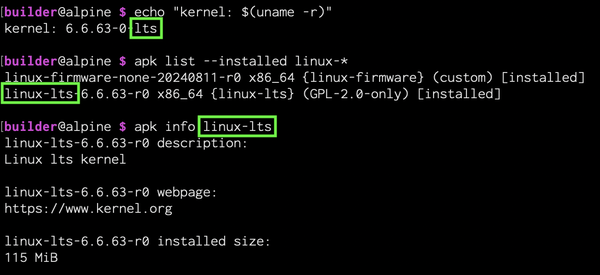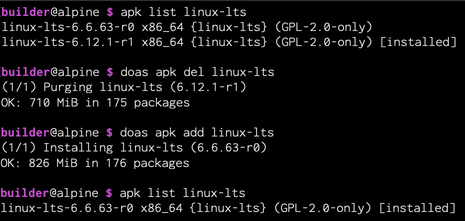User:Anthumchris:How to build the Alpine Linux kernel: Difference between revisions
Anthumchris (talk | contribs) mNo edit summary |
Anthumchris (talk | contribs) No edit summary |
||
| Line 1: | Line 1: | ||
== How to build the Alpine Linux kernel == | == How to build the Alpine Linux kernel == | ||
This [[Tutorials and Howtos|Howto]] quickly demonstrates | This [[Tutorials and Howtos|Howto]] quickly demonstrates how to build and compile the default Alpine Linux [[Kernels|kernels]]. Kernel customizations (not covered here) allow you to experiment by adding/removing kernel modules/features. For example, Alpine releases multiple [[Kernels|kernels]] that vary in features and file sizes. Alpine kernels extend the standard [https://www.kernel.org/linux.html Linux kernel] and build within a few minutes to a few hours (depending on the speed of your system) using <code>[[abuild]]</code>, [https://gitlab.alpinelinux.org/alpine/aports aports], and [https://pkgs.alpinelinux.org/package/edge/main/x86_64/alpine-sdk alpine-sdk]. | ||
== Before you start == | == Before you start == | ||
Revision as of 02:59, 11 December 2024
How to build the Alpine Linux kernel
This Howto quickly demonstrates how to build and compile the default Alpine Linux kernels. Kernel customizations (not covered here) allow you to experiment by adding/removing kernel modules/features. For example, Alpine releases multiple kernels that vary in features and file sizes. Alpine kernels extend the standard Linux kernel and build within a few minutes to a few hours (depending on the speed of your system) using abuild, aports, and alpine-sdk.
Before you start
A running instance of Alpine Linux and a non-root user with doas privileges (i.e. sudo, wheel group) are required to use abuild.
Build & install the kernel
Build
doas apk add alpine-sdk doas addgroup USERNAME abuild # your non-root user git clone --depth 1 https://gitlab.alpinelinux.org/alpine/aports.git abuild-keygen --append --install doas chmod a+r /etc/apk/keys/* # ensure new keys are readable cd aports/main/linux-lts/ time abuild -crK
Identify backup
Identify the package name of your current kernel (e.g. linux-lts, linux-virt). This example shows that linux-lts is the current package that we would revert to as a backup.
echo "kernel: $(uname -r)" apk list --installed linux-*
Install
Find the newly-built kernel file to install. This example shows how to install a newly-built x86_64 LTS kernel:
ls -r ~/packages/main/* doas apk add FILENAME doas reboot
After rebooting, verify the newly-installed kernel version:
echo "kernel: $(uname -r)"
Revert
If needed, revert to the previous backup kernel package we identified earlier. This example shows how to revert to the previous "alpine-lts" package after removing the newly-installed "alpine-lts" (both are named "alpine-lts" yet refer to different versions/locations):
apk list linux-lts # newly-compiled kernel installed doas apk del linux-lts # newly-compiled kernel from file doas apk add linux-lts # previous kernel from Alpine repo apk list linux-lts # previous kernel installed doas reboot


